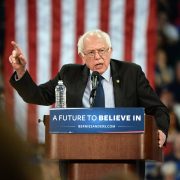With the rise of the open acceptance of “democratic socialism” in America, one thing has become increasingly apparent. That is: what the Left believes the word “freedom” to mean is something entirely different from what the word actually means.
Democratic socialists exist by peddling talking points that include amorphous abstractions disguised as cogent policy prescriptions. Take the Bernie Sanders campaign’s “21st Century Economic Bill of Rights.” His website offers these specific planks:
The 21st Century Economic Bill of Rights establishes that all Americans are entitled to:
- The right to a job that pays a living wage
- The right to quality health care
- The right to a complete education
- The right to affordable housing
- The right to a clean environment
- The right to a secure retirement
There is no freedom without economic freedom.
That last sentence includes the website’s emphasis, not my own. But what is on offer here is not “economic freedom.” It is the promise of economic security through coerced government redistribution, disguised as the proposition of economic freedom.
The first thing you should notice about this list is that none of these six planks in this proposed doctrine include a defined goal. Every single one requires subjective assessments based upon myriad variables in individual circumstances and/or opinions. What is a “living” wage, after all, and who should define it? What is “quality” healthcare, exactly? At what point is one’s education “complete,” and what price is appropriate for “affordable” housing? Who defines the requisite cleanliness of the environment, and what, precisely, constitutes “security” in retirement? If you asked a million Americans those broad, open-ended questions, you would undoubtedly receive a million different sets of answers. Yet the proposition being offered by Bernie Sanders is that an all-powerful government bureaucracy can, and will, precisely define the answers to those questions for every American, if he is elected.
The second thing that should be observed is that each of these “rights” for the recipients of a living wage, health care, education, housing, or environmental and retirement security all require a government imposition against others, who would be required to pay for those secured benefits, thereby shackling some payees in the governmental quest to secure “freedom” for the supposedly oppressed classes that Sanders is courting.
But the most important thing to understand about these policy prescriptions is that one’s economic security or general well-being has absolutely nothing to do with one’s “freedom,” and it never has.
Consider this obvious statement first. The word “freedom” has a fairly precise antonym: “slavery.”
Now, let’s commit to a short thought experiment. Imagine a slave in 1860, and set his circumstances against those of a free sharecropper in 1870. It might be difficult to argue that, from a practical standpoint, the sharecropper’s general standard of living was greatly improved. Yet no honest person, left or right, could claim that the free sharecropper was not the better for having his freedom of agency in his life.
The sharecropping laborer was free to negotiate an acceptable payment for his labor, and consequently apply his freedom of choice to consume a certain percentage of those payments while seeking to profit enough from whatever excess value that his labor provides to care for him and his family in free market transactions. In short, the general well-being of that sharecropper, as it pertains to any perceived lack of secure access to food, housing, or care, has precisely nothing to do with his status as a “free” individual. What made the slave a “slave” was the notion that his care would be provided by others rather than enduring the practical outcomes of the exercise of his own liberty to provide for him, and his own family.
A government benefactor, in the form of a redistributive government politburo, supplanting the archaic slaveowners of yesteryear, is not some great advancement of individual “freedom.” As Mark Steyn observes, in what I believe remains one of the most important and entertaining books of this closing decade, After America: Get Ready for Armageddon:
Freedom is messy. In free societies, people will fall through the cracks – drink too much, eat too much, buy unaffordable homes, fail to make prudent provision for health care, and much else. But the price of being relieved of all those tiresome choices by a benign paternal government is far too high. Big Government is the small option: it’s the guarantee of smaller freedom, smaller homes, smaller cars, smaller opportunities, smaller lives.
What Sanders and his sycophantic cheerleaders are offering is nothing new, to be sure. In fact, Sanders is simply regurgitating FDR’s proposition of a “Second Bill of Rights” that was offered nearly eight decades ago, before socialism’s evil outcomes were nearly as apparent as they are today.
Bernie Sanders, however, would have the government play the role of slaveholder caring for the government’s “assets,” represented, in this case, by Americans’ human capital and wealth, because he believes that the fruits of Americans’ human capital belong to the collective society, and not the individuals who achieved them.
That’s certainly not an argument for individual freedom. Quite the contrary, the argument that Sanders presents is the precise opposite of human freedom.
In this collective set of observable circumstances that we call reality, we cannot call what Sanders offers to Americans “freedom” for anyone. It is not freedom for the individuals who will be fleeced to finance his redistributive aims. And it is not freedom for the masses which he claims are “entitled” to an undefined level of care and economic security that may be provided by a government master. The whims of that master can shift willy-nilly as the winds of popular sentiment blow, as millions of envious grumblers are continually indoctrinated to rage against their neighbors’ successes.
And that, if nothing else has yet done so, should signify that we conservatives are not arguing on the same moral grounds as the Leftists who seek to destroy the foundational notion of individual liberty that so many millions of Americans hold as the dearest principle among our national inheritance, as citizens of the freest nation the world has ever known. “Freedom” has a precise meaning in the context of American liberty. It has nothing to do with a guarantee of one’s economic well-being, and any government official in America promising a guarantee to greater economic well-being or security for some, at the involuntary expense of others, should be regarded as nothing short of a would-be authoritarian tyrant.
And we certainly should not allow such would-be tyrants to pepper the word “freedom” into their campaign propositions, without calling them out for their very apparent political objectives which can only serve to destroy it.













